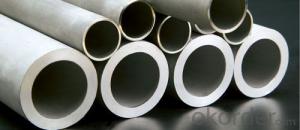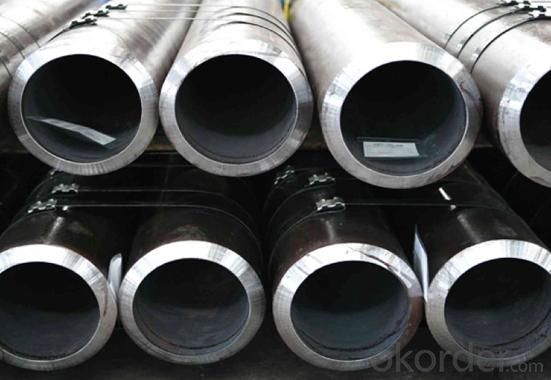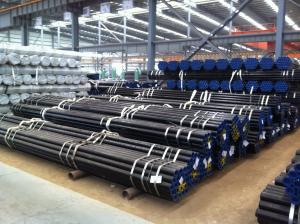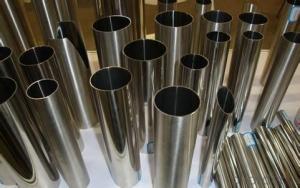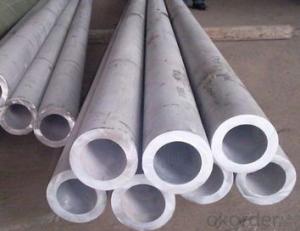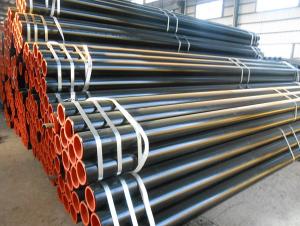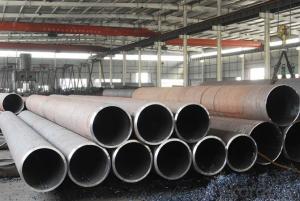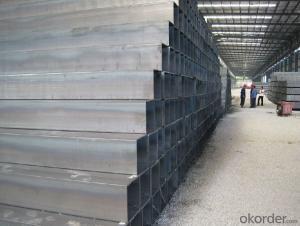Carbon Seamless Steel Tube API 5L standard
- Loading Port:
- Tianjin
- Payment Terms:
- TT OR LC
- Min Order Qty:
- 25 m.t.
- Supply Capability:
- 50000 m.t./month
OKorder Service Pledge
OKorder Financial Service
You Might Also Like
1、Structure of Carbon Seamless Steel Tube Of High Quality API 5L:
As the manufacturing process does not include any welding, seamless pipes are perceived to be stronger and more reliable.Seamless pipe is formed by drawing a solid billet over a piercing rod to create the hollow shell. Historically seamless pipe was regarded as withstanding pressure better than other types, and was often more easily available than welded pipe.
2、Main Features of Carbon Seamless Steel Tube Of High Quality API 5L:
• Strong heat dissipation ability
• Good visual effect
• Reasonable price
• High manufacturing accuracy
• High strength
• Small inertia resistance
3、Carbon Seamless Steel Tube Of High Quality API 5L Specification:
1) Material:20#(ASTM A 106/A53 GRB.API5LGRB,GB),45#,16Mn,10#.
2) Specification range:according to the requirement of clients or OD:21.3-610mm,WT:6-70mm,length:6-12m .
3) Surface:black lacquered, galvanized or varnish coating.
4) Ends:Beveled or square cut,plastic capped,painted.
5) Excutive standards:GB,ASME API5L.ASTM A 106/A53,Despite of the above standards,we can also supply seamless steel pipe with standard of DIN,JIS,and so on,and also develop new products according to the requirements of our clients!
6) Packing:bundles wrapped with strong steel strip,seaworthy packing.
Standard | GB, DIN, ASTM ASTM A106-2006, ASTM A53-2007 |
Grade | 10#-45#, 16Mn 10#, 20#, 45#, 16Mn |
Thickness | 8 - 33 mm |
Section Shape | Round |
Outer Diameter | 133 - 219 mm |
Place of Origin | Shandong, China (Mainland) |
Secondary Or Not | Non-secondary |
Application | Hydraulic Pipe |
Technique | Cold Drawn |
Certification | API |
Surface Treatment | factory state or painted black |
Special Pipe | API Pipe |
Alloy Or Not | Non-alloy |
Length | 5-12M |
Outer Diameter | 21.3-610mm |
Grade | 20#, 45#, Q345, API J55, API K55, API L80, API N80, API P110, A53B |
Standard | ASME, ASTM,API |
4、Packaging & Delivery
Packaging Details: | seaworthy package,bundles wrapped with strong steel strip |
Delivery Detail: | 15-30days after received 30%TT |
5、FAQ of Carbon Seamless Steel Tube Of High Quality API 5L:
①How is the quality of your products?
Our products are manufactured strictly according to national and internaional standard, and we take a test
on every pipe before delivered out. If you want see our quality certifications and all kinds of testing report, please just ask us for it.
Guaranteed: If products’ quality don’t accord to discription as we give or the promise before you place order, we promise 100% refund.
②How about price?
Yes, we are factory and be able to give you lowest price below market one, and we have a policy that “ for saving time and absolutely honest business attitude, we quote as lowest as possible for any customer, and discount can be given according to quantity”,if you like bargain and factory price is not low enough as you think, just don’t waste your time.Please trust the quotation we would give you, it is professional one.
③Why should you chose us?
Chose happens because of quality, then price, We can give you both.Additionally, we can also offer professional products inquiry, products knowledge train(for agents), smooth goods delivery, exellent customer solution proposals.Our service formula: good quality+good price+good service=customer’s trust
SGS test is available, customer inspection before shipping is welcome, third party inspection is no problem.
6、Carbon Seamless Steel Tube Of High Quality API 5L Images:
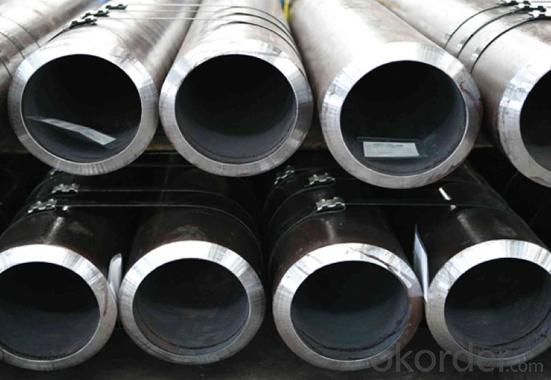
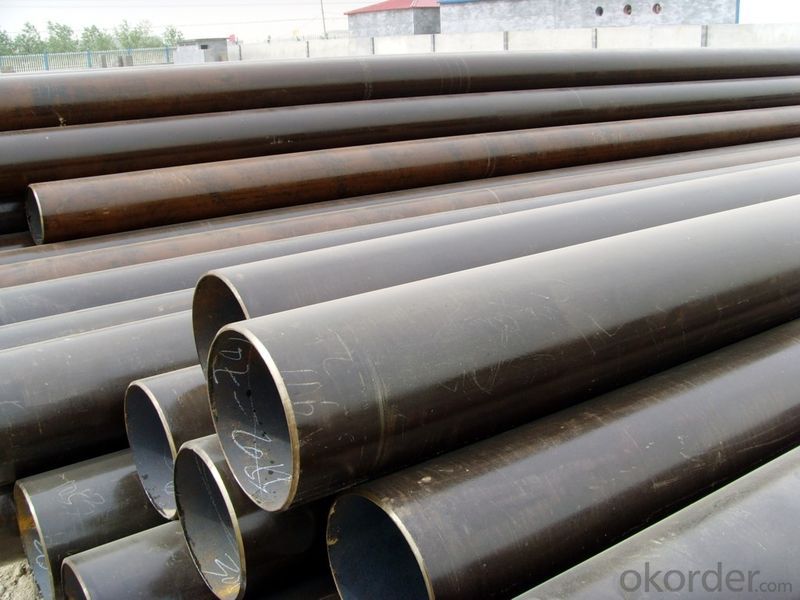
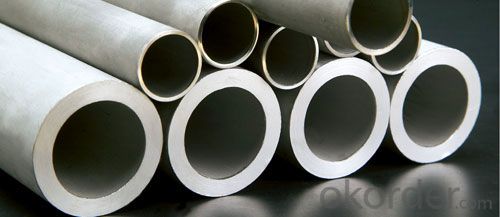
- Q: How are steel pipes coated for protection?
- Steel pipes are commonly coated for protection through a process called galvanization. This involves immersing the pipes in a bath of molten zinc, creating a protective layer that prevents corrosion and extends their lifespan. Additionally, other methods such as epoxy coatings or polyethylene wrappings can be used to provide additional protection against external factors.
- Q: What is the difference between seamless and ERW steel pipes?
- Seamless steel pipes are manufactured without any welding or seams, resulting in a uniform and continuous structure. On the other hand, ERW (Electric Resistance Welded) steel pipes are created by welding the edges of the steel strip or plate together to form a tube. This welding process can cause a visible seam along the length of the pipe. While seamless pipes are generally considered stronger and more reliable due to their uninterrupted structure, ERW pipes are more cost-effective and readily available.
- Q: How are steel pipes measured and specified?
- Steel pipes are measured and specified based on their diameter (nominal pipe size or NPS) and wall thickness (schedule or SCH). The NPS represents the internal diameter of the pipe, while the SCH indicates the thickness of the pipe walls. These measurements are crucial for ensuring proper compatibility and functionality in various applications, such as plumbing, construction, and industrial processes.
- Q: How are steel pipes used in the automotive industry?
- Steel pipes are commonly used in the automotive industry for various applications such as exhaust systems, fuel lines, and structural components. They provide strength, durability, and resistance to corrosion, making them ideal for withstanding high temperatures and harsh conditions. Steel pipes are essential in ensuring efficient exhaust gas flow, delivering fuel to the engine, and providing structural support to enhance vehicle safety and performance.
- Q: How are steel pipes used in the manufacturing of storage tanks?
- Steel pipes are commonly used in the manufacturing of storage tanks due to their high strength, durability, and resistance to corrosion. These pipes are typically used as the main structural component of the tank, providing the necessary strength to support the weight of the stored materials. Additionally, steel pipes can be easily welded together, allowing for the construction of large, seamless tanks that can hold various liquids or gases. Overall, steel pipes play a crucial role in ensuring the integrity and longevity of storage tanks.
- Q: Is there a weld on the outer wall of seamless steel tube?
- Seamless steel pipe's inner wall, outer wall, section, cross section can not see the weld seam. Because seamless steel pipe is a molding product, no late roll pressure, welding and other processes. No section, inner wall, outer wall or section, as long as there is weld, it is not seamless steel tube. The inner wall can not see the outer wall of welding seam, but it can be seen that the weld products are fake or polished goods. Some products can not be seen without friction and have weld seams on the outside wall. They are seamless treated steel tubes and are polished goods. The price is much different from the real seamless steel tube. Some bad wounding, confusing concepts, earn illegal profits.
- Q: Can steel pipes be used for hydraulic systems?
- Yes, steel pipes can be used for hydraulic systems. Steel pipes are commonly used in hydraulic systems due to their high strength, durability, and ability to handle high pressure. They provide excellent resistance to corrosion and can effectively transport hydraulic fluids, making them a suitable choice for various hydraulic applications.
- Q: Can steel pipes be used for stormwater management systems?
- Yes, steel pipes can be used for stormwater management systems. Steel pipes are commonly used in stormwater management systems due to their durability, strength, and resistance to corrosion. They can efficiently handle the flow of stormwater and are suitable for underground installation, making them a reliable choice for managing stormwater runoff.
- Q: How do you calculate the thermal expansion of steel pipes?
- To calculate the thermal expansion of steel pipes, you need to use the coefficient of thermal expansion (CTE) for steel. The CTE is a measure of how much a material expands or contracts with changes in temperature. For steel, the average value of the CTE is typically around 12 x 10^-6 per degree Celsius (12 μm/m°C). To calculate the thermal expansion of a steel pipe, you need to know the initial length of the pipe (L0), the change in temperature (ΔT), and the coefficient of thermal expansion (CTE) for steel. The formula to calculate the thermal expansion is as follows: ΔL = L0 * CTE * ΔT Where: ΔL is the change in length of the steel pipe L0 is the initial length of the steel pipe CTE is the coefficient of thermal expansion for steel ΔT is the change in temperature For example, let's say you have a steel pipe with an initial length of 2 meters (L0), and the temperature increases by 50 degrees Celsius (ΔT). The CTE for steel is 12 x 10^-6 per degree Celsius. ΔL = 2m * 12 x 10^-6/°C * 50°C ΔL = 0.00024m/m°C * 50°C ΔL = 0.012m Therefore, the steel pipe would expand by 0.012 meters or 12 millimeters when the temperature increases by 50 degrees Celsius. It's important to note that this calculation assumes a linear expansion, which is valid for small changes in temperature. However, for larger temperature differences or more complex pipe systems, a more detailed analysis may be required to account for factors such as the pipe's material properties, geometry, and thermal boundary conditions.
- Q: How are steel pipes used in the renewable energy industry?
- Steel pipes are commonly used in the renewable energy industry for various applications. They are used to transport fluids, such as water or steam, in geothermal power plants. Steel pipes are also used in solar thermal power plants for transferring heat transfer fluids. Additionally, steel pipes are utilized in the construction of wind turbine towers, providing structural support for the turbines. Overall, steel pipes play a vital role in the renewable energy industry by facilitating the efficient and reliable operation of different renewable energy technologies.
Send your message to us
Carbon Seamless Steel Tube API 5L standard
- Loading Port:
- Tianjin
- Payment Terms:
- TT OR LC
- Min Order Qty:
- 25 m.t.
- Supply Capability:
- 50000 m.t./month
OKorder Service Pledge
OKorder Financial Service
Similar products
Hot products
Hot Searches
Related keywords
